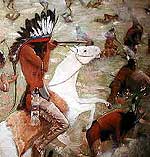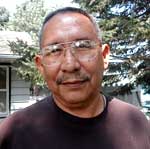By Mark Steil and Tim Post
Minnesota Public Radio
September 26, 2002
| |
|
|
|
||
This is a special time of year for Ed Red Owl. As summer blends with fall, he often thinks of history - the history of his family, the Dakota people, war. It's a complicated road, full of sharp curves and dead ends. When he arrives in 1862 there's a moment of clarity.
"I think of the conditions that they must have had in August of 1862. The crops were not doing well. The agents had failed to provide what they had committed to provide to the people. It didn't happen, and I view it as an act of desperation," says Red Owl.
The remnants of war are still evident in the Minnesota River valley. Time has made them harder to find. There are battlefield markers, monuments, and a few buildings.
Kathleen Backer lives in New Ulm. She's related, by marriage, to settlers killed in the war. Despite the war's impact on her family tree, she's not bitter.
| |
|
|
|
||
"This was devastating to family, this was devastating to humanity. There were broken hearts and broken families on both sides," Backer says.
Much was broken in the war. Some pieces were put back together quickly. Others took years. Some of the broken pieces are hopelessly jagged, and will never fit together.
After the war, it was easier for the settlers to recover. They had the public and the government on their side. The enduring heartache of 1862 is with the Dakota. Some still avoid Mankato - the memories of the hangings are too fresh. Ed Red Owl lives in Sisseton, S.D. He still feels the emotion left by the snap of the ropes.
"We've never really come out of that grief and mourning. We are yet afflicted with that. We seem to be a mourning people at times," he says.
More from MPR

